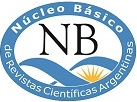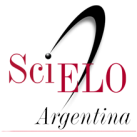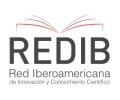El Calor no Siempre Degrada
Aumento de la actividad antirradicalaria del extracto de cáscara De naranja por efecto del pretratamiento térmico.
Keywords:
Ultrasound-assisted Extraction, Orange, Antiradical Activity, Flavonoids, MelanoidinsAbstract
The citrus peel is an industrial residue which mesocarp is rich in the flavonoid hesperidin. If extracts from this residue are to be obtained, it is necessary to dehydrate it in order to facilitate its storage reducing its volume and extending
its lifespan. In the present work the effect of different mesocarp drying treatments -convection and vacuum oven; at 40, and 60 ºC- over the antiradical activity of the extracts obtained afterwards are evaluated. It was found that the ones obtained from the heat-treated samples show higher antiradical activity than the extract obtained from the fresh vegetal material.
This result opposes the generalized concept that heat degrades all bioactive compounds. Furthermore, a positive correlation between the content of total flavonoids and melanoidins and the antiradical activity was found, indicating that both groups of compounds contribute to the observed rise in the antiradical power.

















